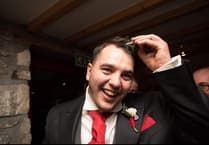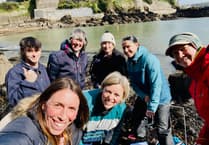I AM currently enjoying a weekly visit to Shipton Abbott over in Devon. It’s a picturesque town on the south coast. There’s a beach, a harbour and a river. There’s even a police station, a very nice café in the grounds of a stately home and houseboat moored at the quay of another stately home.
Also, thanks to the magic of television, I am able to visit Shipton Abbott without leaving my home in South East Cornwall. In fact, although Shipton Abbott is in Devon, it’s actually on my doorstep. Confused?
If you haven’t already guessed, I’m talking about the new BBC series “Beyond Paradise” which, bizarrely, is set in Devon but filmed in locations all around South East Cornwall.
I am not sure why the producers didn’t just set it in Cornwall in the first place!
Beyond Paradise is a gentle crime drama set against a lovely backdrop where the sun always shines. Although if you watch closely enough the cast often look freezing cold, especially Sally Bretton who plays Martha.
But for me the greatest fun is spotting familiar locations. Shipton Abbott itself is actually Looe, somewhere I visit regularly. In a recent episode one scene was filmed in a harbour side café in exactly the same spot I had lunch last year.
The houseboat that features in the programme is moored at Pentillie on the River Tamar, a spot where I often go kayaking.
Some locations are not always so obvious and I spend a lot of the programme trying to guess: “Was that Millbrook? Is that Plymouth University? That’s Mount Edgcumbesurely?”
Beyond Paradise is the latest in a long line of programmes set in Devon and Cornwall and of course they all use artistic licence to suggest that real life locations are all in the same place when in fact they’re miles apart.
Do you remember a series called “The Coroner”? It was mostly filmed in Dartmouth in South Devon, but it always amused me that at the end of a busy day solving crime, they would retire to the local pub that was in fact on the banks of the Tamar at Cargreen in Cornwall. A long way to go for a quick pint after work!
One thing most of these programmes have in common is their ability to make our already lovely scenery look even more beautiful. I mentioned that the sun is always shining in Shipton Abbott. It was the same in The Coroner.
It’s amazing what you can do with lots of lights and a bit of colour treatment in post-production!
But the sun doesn’t always shine on TV. Back in the 1990s Cornwall was the setting for a very successful police drama called “Wycliffe”. I recently watched a couple of repeats and it was always grey, foggy and raining.
It added to the dour nature of Wycliffe himself and gave Cornwall a brooding and almost mythical atmosphere. Let’s face it that’s more realistic than permanently sunny Shipton Abbott!
I was a big fan of Wycliffe because it was filmed in places I knew well, including a few scenes shot in the studio at BBC Radio Cornwall where I was working at the time.
In fact the production base for the series was in a building next door to Radio Cornwall and on one memorable occasion the cast challenged the staff of the radio station to a charity cricket match.
I was chosen as team captain, but had never played cricket and had never understood the game. We were absolutely crushed by the Wycliffe cast!
One of the most famous programmes made here was Poldark. When it was re-launched a few years’ ago the BBC decided to host a special screening at the Plaza cinema in Truro and the leading cast members came along.
It was decided that Spotlight would be broadcast live from the cinema and that I would interview the new Ross Poldark, Demelza, Elizabeth and George.
They were relatively unknown actors at the time and were terrified by the prospect of appearing on live television. So much so that I had to go and meet them in their hotel before Spotlight and reassure them.
After the interview I kept telling them they were about to become hugely famous, but they refused to believe that Poldark would be a massive hit. The rest, as they say, is history.
The following year I hosted a Q&A with the cast at St Austell cinema for the launch of the second series. They were international stars by then and things were very different. Gone was the shy nervousness, replaced instead by a glitzy showbiz aura.
But showbiz, bright lights and fame don’t always appeal to people in Cornwall.
In late 1999 I was asked if I would accompany a senior BBC producer from London who was going to the Isles of Scilly. She wanted the Islands to “star” in the BBC’s live coverage of the Millennium celebrations.
We met leading Islanders in the boardroom of the Steamship Company where the producer hit on the idea of having the Scillonian ferry moored in St Mary’s harbour on Millennium night and have fireworks set off from the ship.
There was a lot of mumbling and shaking of heads from the Steamship Company.
On the flight home the producer quizzed me on their apparent lack of enthusiasm. She couldn’t understand why they didn’t leap at the chance of live national television coverage.
I had to politely explain that here in Cornwall we don’t like fancy London types telling us how to do things, especially media types!
Scilly did feature in the BBC’s coverage in the end and I was lucky enough to be part of the team there on Millennium night, but the people of Scilly rightly did it their wayand there were no fireworks from the Scillonian!
It’s always good to share our beautiful part of the world with television viewers all over the country, even if they sometimes get a bit of a rose tinted version of life here.
But we all need a bit of escapism from time to time. I am already looking forward to my next visit to forever-sunny Shipton Abbott; it’s the only place in Cornwall (or should that be Devon?) where there’s guaranteed sunshine at the moment!
Bye for now.




